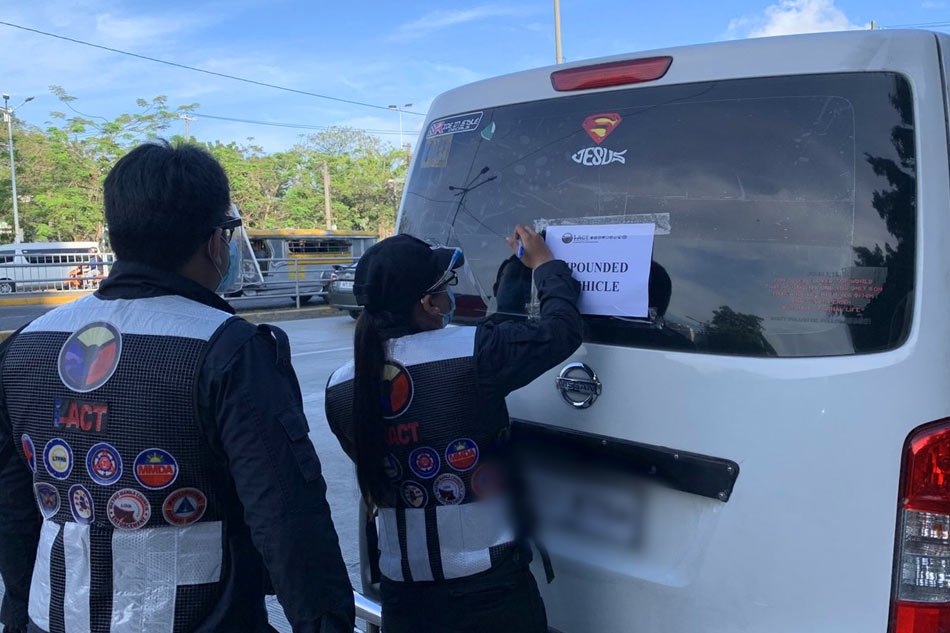DOJ tells DOTr: LTFRB has no power to impound colorum vehicles | ABS-CBN
ADVERTISEMENT
News
DOJ tells DOTr: LTFRB has no power to impound colorum vehicles
DOJ tells DOTr: LTFRB has no power to impound colorum vehicles
Mike Navallo,
ABS-CBN News
Published Jun 07, 2023 03:54 PM PHT
MANILA — The Land Transportation Franchising and Regulatory Board cannot, by itself, apprehend and impound “colorum” vehicles, according to the Department of Justice.
MANILA — The Land Transportation Franchising and Regulatory Board cannot, by itself, apprehend and impound “colorum” vehicles, according to the Department of Justice.
In a legal opinion issued to Transportation Secretary Jaime Bautista dated May 31, 2023, Justice Secretrary Jesus Crispin Remulla contradicted the Department of Transportation’s (DOTr) current position that the LTFRB has enforcement power and authority to do so.
In a legal opinion issued to Transportation Secretary Jaime Bautista dated May 31, 2023, Justice Secretrary Jesus Crispin Remulla contradicted the Department of Transportation’s (DOTr) current position that the LTFRB has enforcement power and authority to do so.
“We advise that LTFRB has no power to apprehend, impound and dispose colorum vehicles. Its authority extends only in the coordination cooperation with other government agencies in the apprehension, impounding and disposal of such vehicles,” Remulla said, in response to former Transportation Secretary Arthur Tugade’s letter dated March 24, 2022.
“We advise that LTFRB has no power to apprehend, impound and dispose colorum vehicles. Its authority extends only in the coordination cooperation with other government agencies in the apprehension, impounding and disposal of such vehicles,” Remulla said, in response to former Transportation Secretary Arthur Tugade’s letter dated March 24, 2022.
Tugade’s letter was based on a query from the Liga ng Transportasyon at Operators sa Pilipinas (LTOP) and the National Federation Transport Cooperative (NFTC) which sought clarification on the issue.
Tugade’s letter was based on a query from the Liga ng Transportasyon at Operators sa Pilipinas (LTOP) and the National Federation Transport Cooperative (NFTC) which sought clarification on the issue.
ADVERTISEMENT
DOTr’s predecessor, the Department of Transportation and Communications (DOTC), previously said the “LTFRB has no enforcement power and can only exercise the same if deputized by LTO (Land Transportation Office).”
DOTr’s predecessor, the Department of Transportation and Communications (DOTC), previously said the “LTFRB has no enforcement power and can only exercise the same if deputized by LTO (Land Transportation Office).”
In changing the department’s position on the issue, DOTr had cited the Public Service Act (Commonwealth Act No. 146) and Executive Order No. 202 which created the LTFRB, as well as some administrative issuances.
In changing the department’s position on the issue, DOTr had cited the Public Service Act (Commonwealth Act No. 146) and Executive Order No. 202 which created the LTFRB, as well as some administrative issuances.
But according to the DOJ, none of the powers and functions of the LTFRB under EO 202 expressly authorizes the LTFRB to apprehend, impound and dispose colorum vehicles.
But according to the DOJ, none of the powers and functions of the LTFRB under EO 202 expressly authorizes the LTFRB to apprehend, impound and dispose colorum vehicles.
“If there was no express grant of authority to apprehend, impound and dispose colorum vehicles, could such power be inferred from other provisions of E.O. No. 202? The answer to this is in the negative,” it said.
“If there was no express grant of authority to apprehend, impound and dispose colorum vehicles, could such power be inferred from other provisions of E.O. No. 202? The answer to this is in the negative,” it said.
The power of LTFRB to enforce its own rules and regulations, the DOJ said, only pertains to specific purposes under section 5(k) of EO 202 while incidental functions under section 5(m) could not be interpreted to include the power to apprehend and impound colorum vehicles.
The power of LTFRB to enforce its own rules and regulations, the DOJ said, only pertains to specific purposes under section 5(k) of EO 202 while incidental functions under section 5(m) could not be interpreted to include the power to apprehend and impound colorum vehicles.
Neither can DOTr invoke Joint Administrative Order (JAO) No. 2014-01, the DOJ added.
Neither can DOTr invoke Joint Administrative Order (JAO) No. 2014-01, the DOJ added.
“[W]e reiterate that without any provision of law granting such power to LTFRB, it has no authority to exercise such powers. Administrative issuances must be in harmony with the law upon which such issuances are based,” it said.
“[W]e reiterate that without any provision of law granting such power to LTFRB, it has no authority to exercise such powers. Administrative issuances must be in harmony with the law upon which such issuances are based,” it said.
The DOJ also explained that “while the power to apprehend, impound and dispose colorum vehicles may be argued as incidental to the power to issue franchises, it is not necessary in the exercise or discharge of the latter.”
The DOJ also explained that “while the power to apprehend, impound and dispose colorum vehicles may be argued as incidental to the power to issue franchises, it is not necessary in the exercise or discharge of the latter.”
Instead, the DOJ said the LTO and the Traffic Management Unit of the Philippine National Police (PNP) are the agencies authorized to enforce traffic rules and regulations under the Land Transportation and Traffic Code (RA 4136) and the Department of the Interior and Local Government Act of 1990 (RA 6975).
Instead, the DOJ said the LTO and the Traffic Management Unit of the Philippine National Police (PNP) are the agencies authorized to enforce traffic rules and regulations under the Land Transportation and Traffic Code (RA 4136) and the Department of the Interior and Local Government Act of 1990 (RA 6975).
FROM THE ARCHIVE
ADVERTISEMENT
ADVERTISEMENT

